Rome: Figure
Go to : ANCIENT ROME | MEDIEVAL ROME | RENAISSANCE ROME | BAROQUE ROME | ROMANTIC ROME | MODERN ROMEANCIENT ROME
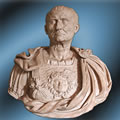
Galba Emperor
Servius Sulpicius Galba, Nero's successor, was the first emperor who took power with the support of the Legions; after him the successions in power were transformed into conquests of power by charismatic or opportunist generals who were in command of the most expert legions or who enjoyed the confidence of the praetorians ...
Continue »
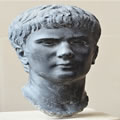
Agrippa Postumus (12 B.C. – 14 A.D.)
When Marcus Vipsanius Agrippa died in March 12 B.C. in Campania, his wife Julia was expecting a child who was born 5 months after the death of his father and was named Agrippa Postumus; it was customary for the Romans to give the name of Postumus to children born after the death of their father ...
Continue »

Sulpicia, poetry and eroticism
The poets in Rome did not have an easy life, they had to have a protector, a patron and the luckiest were those who lived in the first century of the Empire when the convivialities were cheered by the declamations of Virgil, Ovid, Catullus, Martial who composed praising poems to virtues, to the country but also to feelings and above all to love. But two poetesses also sang of love, both of whom are remembered with the name of Sulpicia ...
Continue »
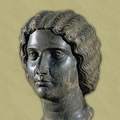
Julia Soemia
Julia Soemia Bassiana was in fact empress as regent for the young Elagabalus whom she joined in the short years of reign and whose death she shared. Her name is linked to the Severi dynasty to which it belonged because she was the niece of Julia Domna, wife of Septimius Severus and both were Syrian women having been born in Emesa from the rich and powerful family that descended from Gaius Julius Bassianus or Bassus, priest-king of Armenia and clientes of Rome; she her full name was Julia Soaemias Bassiana and she was born in 180 AD ...
Continue »

Callixtus, banker, convict and then Pope
The Callixtus's life has many shadow areas; he was Pope at a time when the Church was already mauled by clashes of opposing factions so much that he died stoned to death in the bottom of a well and for this consecrated martyr of the Roman Church; his name remained linked to the hypogeum cemetery of the first Christians on the Via Appia, the Catacombs of Saint Callixtus, of which he was the first custodian ...
Continue »
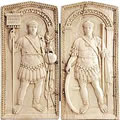
Gens Anicia: Emperors, Popes, philosophers and saints
Celio Hill was a silent witness of the great changes in Rome from the archaic age to the Empire and then also of the passage from Pagan Rome to Christian Rome; on the Celio have always inhabited some of the important families of the Urbs and on the Collis Querquetulanus, starting from the first century AD, had its own domus the gens Anicia. The history of the gens Anicia, rich owner of large estates in Italy and in the Provinces, can help to understand the great, and sometimes violent, changes of the Roman state; the family has given to Rome emperors, consuls and prefects, popes, bishops and saints: Gregorovius remembers that "... the senatorial family of the Anici ... was the first to embrace the Christian faith". The Anicii arrived in Rome from Praeneste and the first exponent of the family of which we have news is Quintus Anicius Praenestinus who was appointed curule edile ( magistrate) in 304 BC; but the first really important charge was the consulate obtained by Lucius Anicius Gallus in 160 BC. Anicius Gallus in 168 BC when he was a praetor, was the conqueror of Illyria where, with a campaign lasting just 30 days, he managed to defeat Gentius and his Illyrians first by sea and then by land; the Senate of Rome decreed the triumph for Anicius in which the defeated king, Gentius and his wife and children took part ...
Continue »
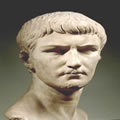
Caligula and the mystery cults
Gaius, called Caligula, was the third son of Germanicus and Agrippina the Elder, during his imperium he had unacceptable behavior for Roman morals and incomprehensible even for those who followed him above all out of fear; this behavior was imputed to the observance of mystery cults or to madness, but it is possible that there is another interpretation ...
Continue »
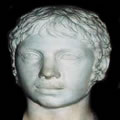
Elagabalus
The young son of Julia Soemias and the late Senator Sextus Varius Marcellus, was acclaimed emperor by soldiers of Legio III Galica and Legio II Parthica stationed in Emesa, in May 218 AD. They were his mother and his grandmother Julia Maesia, sister of Julia Domna, wife of Septimius Severus, who claimed his right to succeed Caracalla, but not so much for the royal kinship, but because they did believe the legions that the real father of Varius Bassianus, this it was his name, it was truly Caracalla, a fact that seemed confirmed by a certain resemblance as well as by the presence in Rome of Giulia Soemias at the time of conception ...
Continue »
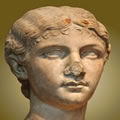
Antonia the Younger
In the Acta Collegium Fratrii Arvalium, her birth was registered on January 31st of 36 BC; she was conceived in Athens in 37 BC before his father Marc Antony left for the war against the Parties, he would never return to Rome and little Antonia will never see him ...
Continue »
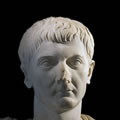
Drusus the younger
In the summer of 15 BC Vipsania Agrippina, wife of Tiberius, was at Antium when she gave birth to Nero Claudius Drusus, called Drusus Julius Caesar to distinguish him from his uncle Drusus the Elder ...
Continue »
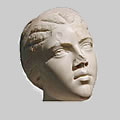
Fulvia Plautilla Empress
She was the first wife of Caracalla from 202 to 205. She was born in 182 by Fulvius Plautianus who became Prefect of the Praetorian in 197 during the reign of Septimius Severus. In 198 Septimius joined his son Caracalla in power; Caracalla was 10 years old and he was betrothed Plautilla who had already 16 years; for the wedding they had to wait at least 14 years old of the groom and so Plautilla became Augusta in 202 ...
Continue »
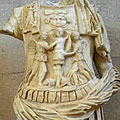
Flavius Etius the last Roman general
He was born in Durusturum, Moesia Inferior (modern Bulgaria) in 390 son of Gaudentius, a magister equitum of Shiite origin and of a noble and rich woman Italic; he began his career as a Praetorian and only 19 years old was already praetorian prefect. He was of average build but by energetic ways; knew several languages: the greek, Latin, Gothic and Hun because from 405 to 408 was given as a hostage to Alaric I, king of the Goths, from whom he learned to deal with the barbarians in peace and war and then sent to Rua chief Huns. The years passed between the Goths and the Huns fostered friendships with those people with whom later will partner or will face in battle ...
Continue »
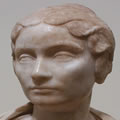
Aurelia Cotta - The mother of Julius Caesar
She was born in Rome on May 21, 120 BC, daughter of Lucius Aurelius Cotta who was consul in the year after hers birth; the mother was called Rutilia and even her family was of consular rank. The gens Aurelia had cognomina Cotta, Scaurus, and Orestes and, in the first century, a branch was called Fulvus, to this belonged Titus Aurelius Fulvus who became emperor under the name of Antoninus Pius ...
Continue »
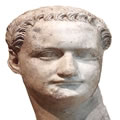
Emperor Titus
The phrase by Suetonius "Amor ac deliciae generis humani", love and delight of mankind, expresses what his contemporaries thought to the Emperor Titus and ...
Continue »
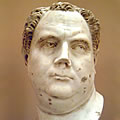
AULUS VITELLIUS, IMPERATOR (15 D.C. – 69 D.C.)
Aulus Vitellius Germanicus was emperor for eight months, from April 16 to December 22 of A.D. 69, he came to power after Galba and Otho ...
Continue »
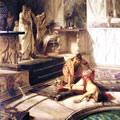
Nero and Otho, Poppea and Statilia
Love and marriage in imperial Rome. Nero and Otho they met very young and did a strange physical ...
Continue »
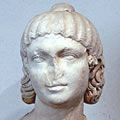
The Empress Tranquillina
She married the Emperor Gordian III in May of 241, its official name was Furia Sabinia Tranquillina Augusta; She was the daughter of the Praetorian ...
Continue »
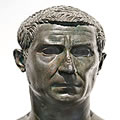
Lucius Calpurnius Piso Pontifex
Augustus had elected Lucius Calpurnius Piso prefect of Rome in A.D. 13 and he was up to the date of his death in 32 AD; He came from a prominent ...
Continue »

Julia Aquilia Severa
In 220 A.D. the young Emperor Elagabalus, decided to marry the Vestal Maxima and in his madness was also able to impose its will to the Senate ...
Continue »
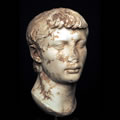
Marcellus, heir of Augustus
Marcus Claudius Marcellus was the designated heir by Augustus to the succession; was the son of his sister Octavia Minor and Gaius Claudius ...
Continue »

Lucius Junius Brutus
He was the founder of the Roman Republic and who led the revolt of the people and the Senate of Rome against the Tarquini and, after their expulsion ...
Continue »
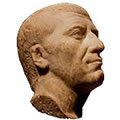
Gneo Domizio Corbulo: "Axios! I am worthy!"
He had to be a Caesar, but he was a great general whose name has crossed the centuries becoming a symbol of moral integrity: his name was Gneus ...
Continue »
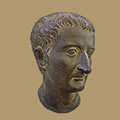
Emperor Claudius: Nomen Omen
Guaranteeing success later is something that happens rarely in antiquity was almost impossible if you had malformations or disability, but history gives us ...
Continue »
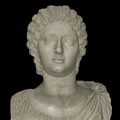
Iulia Augusti Filia
Augustus loved his family, had a large family and very "enlarged" in the modern sense and bore this love to the whole world that ruled by raising throughout ...
Continue »
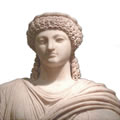
Statilia Messalina
She was the third wife of Nero: Statilia was born in Rome in 35 BC, she was descended from Tito Statilius Taurus who had built Statilius Theatre in ...
Continue »
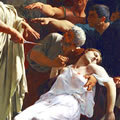
Lucretia Romana
Rome was still a fairly small town at the end of the seventh century. B.C. and its expansion began with the annexation of the neighboring cities, in the early sixth ...
Continue »
MEDIEVAL ROME
RENAISSANCE ROME

Reginald Pole Cardinal in Rome
Reginal Pole was an important and unique figure of prelate and politician who, if he had become Pope, he could change the history of the Christian Church and, perhaps, of the West. The Cardinal stayed for a long time in Italy and in Rome he was also Deacon of Santa Maria in Cosmedin, but very important was his diplomatic action with he tried to bring the Church of England back into the papacy orbit; with the protection of Queen Mary, he was the last Catholic archbishop of Canterbury. Cardinal Reginal Pole was linked by close ties of kinship with the royal family; he descended from the Plantagenets because his mother was the nephew of two kings, Edward IV and Richard III, and this made him one of the closest relatives of Enrivo VIII who protected him and wanted to pay his education ...
Continue »






